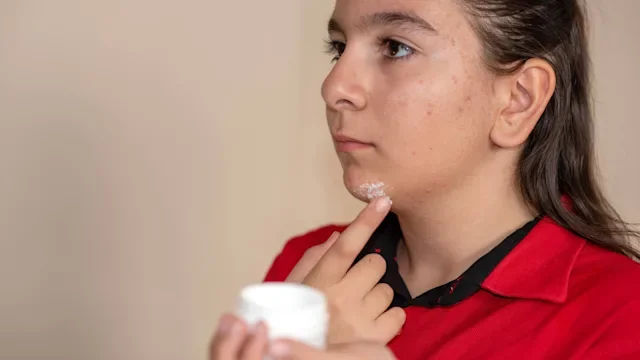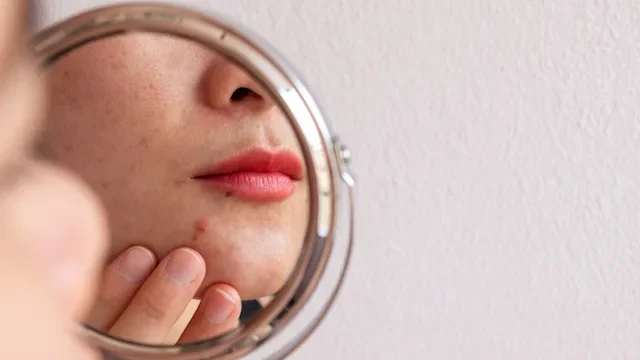Key takeaways:
Retinol is the most important anti-aging ingredient.
Many people experience dryness and irritation from retinol.
You can successfully add retinol into your skin care regimen by choosing the right retinol product and following some simple instructions.
When it comes to anti-aging skin care, retinol is the gold standard. It improves skin texture, reduces fine lines, and lessens hyperpigmentation. But it also increases skin cell turnover and collagen production. These factors mean that it can dry out your skin and make it more sensitive. You can get the benefits of retinol and minimize side effects by choosing the right product for your skin type and using it properly.
What is retinol, and how does it help with anti-aging?
Retinol is a topical form of vitamin A you can get over the counter. When you put it on your skin, it turns into its active form, which is known as retinoic acid. Pure retinoic acid (tretinoin) is available by prescription.
There are many anti-aging benefits to using retinol, including that it:
Increases collagen by boosting production and blocking the enzymes that break it down
Enhances skin cell turnover
Thickens skin
Improves fine lines and wrinkles
Brightens skin
Evens pigmentation
Makes skin smoother
Search and compare options
What are the side effects of using retinol?
The major side effect of topical retinol is skin irritation, which can look or feel like redness, dryness, stinging, burning, or peeling. Your skin becomes more sensitive to other products, to the sun or wind, and to procedures like lasers, waxing, and chemical peels. Stronger, prescription-strength retinoids are more likely to cause side effects than over-the-counter retinols.
What are the biggest differences between retinol products?
There are many types of retinol products available over the counter. They vary in strength and come in different forms, like gels, creams, lotions, serums, or oils. Some are combined with alpha hydroxy or beta hydroxy acids, built-in moisturizers, or antioxidants.
The biggest difference between over-the-counter retinol products and prescription retinoids is strength: Prescription retinoids are more potent but also more drying and irritating. While prescription-strength retinoids work best for acne, they don’t necessarily work better for anti-aging.
Which retinol product should you choose?
The best retinol product for you is one that you can tolerate using every night. If you’re unable to build up your nighttime tolerance, you can try using it over your moisturizer or switch to a lighter product.
Recommendations for well-tolerated retinol products are based on your skin type, and include:
Dry skin: You’ll need a retinol that’s in products with moisture-trapping, hyaluronic acid, and ceramide, which will help prevent drying out.
If you want a “steal,” try Neutrogena Rapid Wrinkle Repair Retinol Oil.
If you want to splurge, try Sunday Riley Luna Sleeping Oil.
Combination skin: That is, for skin that is alternately oily and dry, some products could make the skin too greasy with an oil but too dry with a gel. Serums or creams usually work best for this skin type.
If you want a “steal,” try Roc Retinol Correxion Deep Wrinkle Serum.
If you want to splurge, try SkinBetter’s AlphaRet Night Cream.
Oily or acne-prone skin: You’ll want a product that will lessen oil production and not feel heavy on your skin. There’s a chance you’ll get the best results from a prescription product, but there are good over-the-counter options to start with.
If you want a “steal,” try Adapalene 0.1% gel (Differin or La Roche Posay Effaclar).
If you want to splurge, try Neova Intensive Retinol Spray.
What to know before using retinol
Before starting a retinol, it’s best to simplify your regimen. Avoid other potentially irritating active ingredients, like alpha hydroxy or beta hydroxy acids. Either of these in combination with retinol could make your skin more sensitive to the retinol. Here’s some tips for starting to use retinol:
Start by using a little at a time. All you need is a pea-sized amount for your entire face.
For the first few weeks, use it every other day or every third day.
You can build up to every day as tolerated.
Keep your skin well-hydrated with a moisturizer.
Use a broad spectrum sunscreen daily, as retinol makes your skin more sensitive to the sun.
Stop using your retinol a week before intense sun exposure or any facial procedure, like waxing, lasers, or peels.
You should avoid using retinol if you’re pregnant or nursing.
The bottom line
Retinol is a key ingredient in treatments for acne and anti-aging skin care. You can successfully address your skin care issues by picking the right product for your skin type and using it properly.

Why trust our experts?


References
Babcock, M., et al. (2015). A randomized, double-blind, split-face study comparing the efficacy and tolerability of three retinol-based products vs. three tretinoin-based products in subjects with moderate to severe facial photodamage. Journal of Drugs in Dermatology.
Thielitz, A., et al. (2008). Topical retinoids in acne vulgaris: Update on efficacy and safety. American Journal of Clinical Dermatology.
Zasada, M., et al. (2019). Retinoids: Active molecules influencing skin structure formation in cosmetic and dermatological treatments. Advances in Dermatology and Allergology.














